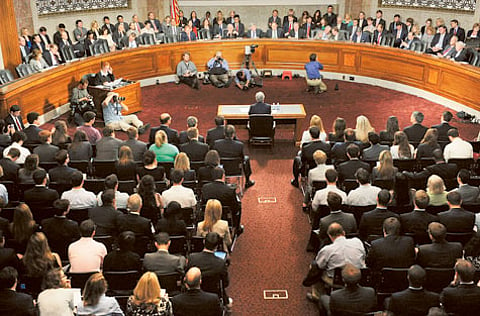Pro-Wall Street lawmakers unmoved by Libor rate-rigging
November’s presidential poll has left little scope for legislative action

London: In the UK, a record fine for Barclays Plc has triggered outrage from lawmakers. In the US, Wall Street’s defenders in Congress are sticking by the industry, undaunted by the Barclays fine or the trading losses of more than $2 billion (Dh7.35 billion) at JPMorgan Chase & Co.
While the US Senate and House of Representatives have held hearings on JPMorgan and lawmakers have started to pay attention to allegations that banks, including Barclays, may have colluded to set interest rates, November’s presidential election and partisan gridlock have left little opening for legislative moves affecting banks, including New York-based JPMorgan, Goldman Sachs Group Inc. and Bank of America Corp.
“In terms of legislative calendar, it’s late in the clock and there’s not a lot to be done here pre-election,” Mark Calabria, a former Republican Senate Banking Committee aide, said in a telephone interview. “Regardless of what happens at JPMorgan, Congress is leaving at the beginning of August barring the financial system itself actually collapsing. And even then, Congress would probably still take a recess.”
Through two high-profile hearings with JPMorgan chairman and chief executive officer Jamie Dimon, lawmakers’ ideological and policy fault lines remained bright and unmoved. Some House and Senate Democrats, including Senator Jeff Merkley of Oregon and Representative Barney Frank of Massachusetts, used the New York-based bank’s trading loss as ammunition in the fight for tighter regulations on Wall Street and funding increases for their federal overseers.
Parties polarised
The 2010 Dodd-Frank Act polarises the parties and the presidential candidates. Former Massachusetts Governor Mitt Romney, the presumptive Republican nominee, has pledged to repeal Dodd-Frank. President Barack Obama cites the law as one of the cornerstone achievements of his first term in office.
Republicans, meanwhile, have seized on losses by JPMorgan’s chief investment office as evidence that Dodd-Frank puts too much reliance on regulators who were unable to detect the risks that led to the losses. They also argue that JPMorgan shouldn’t serve as a whipping boy because, unlike the 2008 financial crisis, the bank required no federal bailout after the losses were disclosed in May.
“This is how the system is supposed to work,” Representative Spencer Bachus, the chairman of the House Financial Services Committee, said in his opening statement of the panel’s June 19 hearing with Dimon. “Those who take the risks are the ones who suffer the loss or realise the gain.”
Legislative options
That doesn’t mean lawmakers don’t have legislative options. Members of both parties in the House and Senate have introduced measures to make a broad spectrum of changes to how Wall Street does business, from shrinking the largest banks and barring bank officials from serving on the boards of regional Federal Reserve banks, to repealing or loosening portions of the Dodd-Frank Act’s restrictions on the trading of derivatives.
The Republican-led Financial Services panel has churned bills to make changes to Dodd-Frank and has scheduled five hearings in July to examine the impact of the law on various sectors of the marketplace.
Still, in an election year with a looming “fiscal cliff” — a raft of expiring tax provisions paired with the beginning of $1.2 trillion in automatic spending cuts over a decade — proposed changes to Wall Street’s rules are expected to languish, according to Edward Mills, a financial analyst at Arlington, Virginia-based FBR Capital Markets.
“Congress responds to crisis and deadline,” Mills, a former Democratic aide on banking and financial services issues in the House and Senate, said in a telephone interview. “Absent a crisis, we’re not going to see anything and the only real deadline on the horizon is the fiscal cliff issue at the end of the year.”
Political donations
Wall Street's financial influence — political action committees from the securities and investment industry have contributed $6.7 million to lawmakers in the 2012 cycle, according to the Centre for Responsive Politics — may also play a role as lawmakers on both sides of the aisle look for a financial advantage in the final months of their campaigns, Calabria, who is now director of financial regulations studies at the Washington-based Cato Institute, which promotes free markets, said.
In the presidential race, Romney, the former head of Bain Capital LLC, has swung the financial support from the securities and investment industry heavily in his favour, according to the Centre for Responsive Politics. The Republican has collected $9.4 million from the industry, while Obama, whose campaign has focused in part on Romney’s career in private equity, has pulled in $3.4 million.
Barclays pledged to pay $200 million to the CFTC, $160 million to the Department of Justice, and £59.5 million (Dh342.93 million) to the UK’s Financial Services Authority. The fines were the largest in the history of the CFTC and FSA.
“The CFTC’s success in uncovering the outrageous manipulation of the Libor, and the consequent settlement which will bring to the US Treasury hundreds of millions of dollars, demonstrates the value of that agency,” Frank said in a June 29 statement.
Citigroup Inc., Royal Bank of Scotland Group Plc, UBS AG, ICAP Plc, Lloyds Banking Group Plc and Deutsche Bank AG are among the firms regulators are investigating. A total of 18 banks are surveyed as part of the process of determining Libor and related rates.
US Senate Democrats are seeking to increase the budget of the main financial-markets regulators in spending plans that clash with House Republicans’ efforts to cut funds and rein in the reach of Obama’s financial regulation law.



